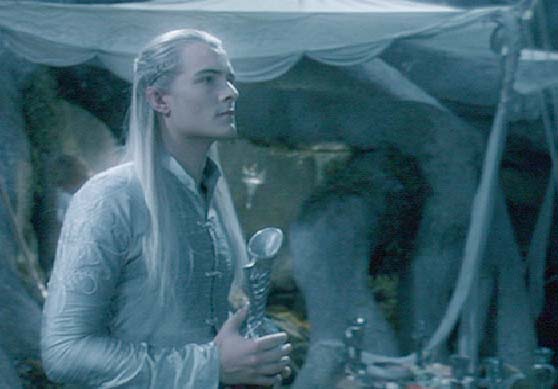|
This was the bridge that led across the river to the king's doors. The water flowed dark and
swift and strong beneath; and at the far end were gates before the mouth of a huge cave that ran
into the side of a steep slope covered with trees. There the great beeches came right down to the bank,
till their feet were in the stream.
Across the bridge the elves thrust their prisoners, but Bilbo hesitated in the rear. He did not at all
like the look of the cavern-mouth, and he only made up his mind not to desert his friends just in time
to scuttle over at the heels of the last elves, before the great gates of the king closed behind them
with a clang.
Inside the passages were lit with red torch-light, and the elf-guards sang as they marched along the twisting,
crossing, and echoing paths. These were not like those of the goblin-cities; they were smaller, less
deep underground, and filled with a cleaner air. In a great hall with pillars hewn out of the living
stone sat the Elvenking on a chair of carven wood. On his head was a crown of berries and red leaves, for the autumn
was come again. In the spring he wore a crown of woodland flowers. In his hand he held a carven staff of oak.
...
Companies of the Wood-elves, sometimes with the king at their head, would from time to time ride out to hunt,
or to other business in the woods and in the lands to the East.
...
One day, nosing and wandering about, Bilbo discovered a very interesting thing: the great gates were not
the only entrance to the caves. A stream flowed under part of the lowest regions of the palace, and joined
the Forest River some way further to the east, beyond the steep slope out of which the main mouth opened.
Where this underground watercourse came forth from the hillside there was a water-gate. There the rocky roof
came down close to the surface of the stream, and from it a portcullis could be dropped right to the bed of the river to
prevent anyone coming in or out that way. But the portcullis was often open, for a good deal of traffic went out
and in by the water-gate. If anyone had come in that way, he would have found himself in a dark rough tunnel
leading deep into the heart of the hill; but at one point where it passed under the caves the roof haed been cut away and covered
with great oaken trapdoors. These opened upwards into the king's cellars.

There stood barrels, and barrels, and
barrels; for the Wood-elves, and especially their king, were very fond of wine, though no vines grew in those parts.
The wine, and other goods, were brought from far away, from their kinsfolk in the South, or from the vineyards
of Men in distant lands.
|











 Copyright © 2003, Mary S. Van Deusen
Copyright © 2003, Mary S. Van Deusen